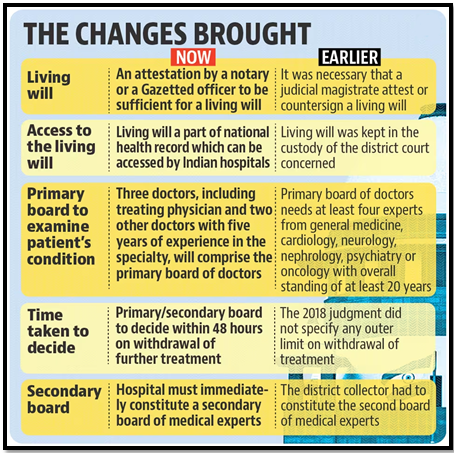A DIGNIFIED PEACEFUL PASSING IS EVERYONE’S RIGHT
SYLLABUS:
- GS 2: Constitution of India —historical underpinnings, evolution, features, amendments, significant provisions and basic structure.
- Government policies and interventions for development in various sectors and issues arising out of their design and implementation.
Focus:
- World Health Day (April 7) has passed and the theme for 2024 was “My health, my right”.
The Importance of a Dignified Peaceful Passing
- Universal Right: A dignified peaceful passing is considered a fundamental human right, emphasizing the importance of respect and compassion at life’s end.
- Quality of Life: Ensuring a peaceful death contributes to maintaining the quality of life even in its final stages, allowing individuals to die with dignity and peace.
- Emotional Comfort: A dignified death provides emotional comfort to both the dying individual and their loved ones, making the process less traumatic.
- Ethical Considerations: It aligns with ethical medical practices that prioritize patient wishes over prolonged suffering through unnecessary interventions.
- Cultural and Personal Values: Respecting personal and cultural values at the end of life supports a broader range of end-of-life care options that honor those values.
The evolution of the concept of ‘Living Will’ in India can be traced through significant legal milestones:
|
Case stidy for Comparison of End-of-Life Experiences
Ronald Reagan’s Passing:
- Family Presence: Died at home surrounded by family, highlighting the comfort of familiar surroundings.
- Personal Wishes Honored: His end-of-life care respected his personal wishes, as reflected by his wife’s statement about his peaceful passing.
- Dementia Management: Managed a long-term illness (dementia) with dignity at home.
- Public Perception: His passing was seen positively and as a model for dignified dying.
Atal Bihari Vajpayee’s Passing:
- Hospital Setting: Spent his last days in a hospital, contrasting with a home setting.
- Life Support: Died on artificial life support, indicating a more medicalized approach to end-of-life care.
- Isolation from Family: Lacked the immediate comfort of family in his final moments, as he was alone in the ICU.
- Ethical Questions: Raises questions about the ethical implications of prolonged life support without clear benefits.
- Public Policy Impact: His death highlights differences in end-of-life care practices between countries and could influence future healthcare policies.
Active euthanasia V/S Passive euthanasia
|
Cultural and Systemic Differences in End-of-Life Care
- Advance Directives: In Western countries, there is a growing adoption of advance medical directives to ensure that end-of-life care respects individual wishes.
- Palliative Care: Western healthcare often transitions to palliative care when recovery is unlikely, focusing on comfort rather than cure.
- Legal Frameworks: Western countries typically have clearer legal frameworks supporting the withdrawal of life support in futile situations.
- Public Awareness and Acceptance: There is greater public awareness and acceptance of end-of-life care options, including the right to die with dignity.
- Contrasts with India: In India, there is a higher prevalence of life support use in terminal cases, less use of palliative care, and significant legal and ethical challenges in end-of-life care decision-making.
This structured outline provides clarity on the importance of a dignified passing, how different cultural and systemic settings impact end-of-life experiences, and the specific cases of Ronald Reagan and Atal Bihari Vajpayee.
Various countries have diverse laws regarding euthanasia and assisted suicide:
|
Source:The Hindu
Mains Practice Question:
“Discuss the significance of ensuring a dignified peaceful death for terminally ill patients in the context of differing global practices. Illustrate your argument with the contrasting end-of-life experiences of Ronald Reagan and Atal Bihari Vajpayee. Additionally, evaluate how cultural, ethical, and legal factors influence the choices and implementation of end-of-life care in different countries.”
Associated Articles:
https://universalinstitutions.com/living-wills-status-of-euthanasiain-india/#




